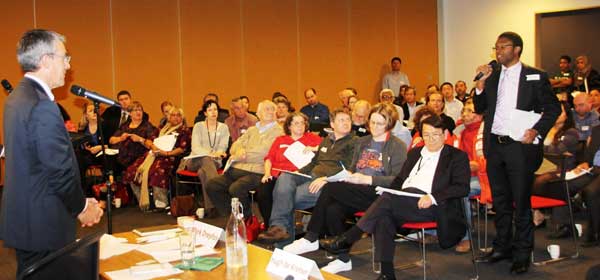Australia’s former Attorney General Mark Dreyfus allegedly told a prominent refugee advocate he felt “shame” at his party’s policies towards asylum seekers and that dozens of refugees could not be released from indefinite detention because Labor was afraid they’d be depicted as ‘soft’ by the Liberals during an election year.
The comments were allegedly made at a public meeting at the Dandenong Civic Centre in April this year, where Dreyfus, the local member for Isaacs, attended to discuss proposed amendments to section 18c of the Racial Discrimination Act.
Also there was Trevor Grant, convenor of the Tamil Refugee Council and an active member of the group Friends For Refugees. Mr Grant served as a journalist for Fairfax and News Limited for four decades.
In a piece written for New Matilda, published here, Mr Grant explains that at the end of the forum, during questions, he publicly challenged the former Attorney General over the fate of around 50 refugees, who received negative assessments by the Australian Security Intelligence Organisation (ASIO) and are being held in indefinite detention.
“I wonder if there are any pangs of guilt or shame or even can you see a contradiction about the fact that you cry out tonight for people’s human rights… and yet when you had a better opportunity to follow this path, when you had your hands on the levers of power, you chose denial of basic human rights and to continue to inflict suffering on innocent people,” Mr Grant asked during the forum.
Mr Dreyfus gave a brief response, acknowledging difficulties with the treatment of detainees, but promised to address the issue personally with Mr Grant at the conclusion of the forum.
“What he had to say to me away from the microphone left me shaking my head in disbelief,” Mr Grant writes.
“Dreyfus told me that he felt ‘shame’ that he was unable to release these refugees during his eight-month stint last year as the nation’s number one legal officer.
“He said he fully understood the injustice of their situation. He said that one of his children visited these refugees in Melbourne detention centres and that he had considered doing the same thing.
“Then he explained why he couldn’t release them. He said it would have been impossible to get their release through cabinet in an election year.
“The fear of being branded soft on terrorism by Abbott far outweighed the need to do what he knew was the right thing.”
Grant said that at the time, Dreyfus’ comments struck him as “sincere”, however a month later, Labor supported changes to the Migration Act through the Senate that prevent refugees with negative ASIO assessments from applying for protection visas.
“I knew I had been conned,” Grant writes.
He later discovered that Dreyfus had also personally voted for the amendments in the House of Representatives, two months before the community forum.
“Now I also understand why the Labor Party has become an object of derision, even among its own supporters, having morphed into a shameless bottom-feeder, plumbing the turgid depths of political convenience in the search for a few cheap points here and there.
“Indeed, it’s this pitiful abandonment of principle and supposed Labor values, notably on the issue of asylum seekers and refugees, that should have Dreyfus, and his colleagues, awash with shame.”

New Matilda provided Mr Dreyfus a copy of the Mr Grant’s article, prior to publication.
A spokesperson for Mr Dreyfus replied: “Mr Dreyfus disagrees with Mr Grant’s representation of the answer he gave during the public forum on April 9 and the private conversation that took place after that forum.”
For his part, Mr Grant strongly rejected suggestions Mr Dreyfus’ comments were made during a “private conversation”.
"I did not solicit Dreyfus for this discussion. It was the other way around,” he told New Matilda.
“He approached me in this public forum and spoke to me. I did not ask him any questions. He made these statements of his own volition. He spoke to many people in the same space, and there were many other people around us as he spoke to me.
“At no stage did he indicate that his statements to me were meant to be ‘private.’”
Mr Grant said he did not raise the issue of Mr Dreyfus’ children with him.
“He volunteered the information, presumably as a means to support his story that he was very sympathetic to the ASIO-rejected refugees,” he said.
"If only he showed similar concern for the children of refugees locked behind razor wire. Like the eight-year-old boy I visit in detention who has been diagnosed with PTSD, depression and anxiety and who took to self-harming last year by ramming sticks into his ears and risking damage to his hearing.
“This was happening when Dreyfus's party was in government and he was Attorney General with the power to release his parent and bring an end to the boy's suffering.”
Mr Grant also defended his decision to write an article about the exchange.
"I decided, as a refugee advocate, to write an opinion piece after I learned that his words to me were in direct contrast to his actions in parliament this year.
“I believe it is important for people to know when a politician says one thing to voters at a forum and does another in parliament."
Donate To New Matilda
New Matilda is a small, independent media outlet. We survive through reader contributions, and never losing a lawsuit. If you got something from this article, giving something back helps us to continue speaking truth to power. Every little bit counts.



